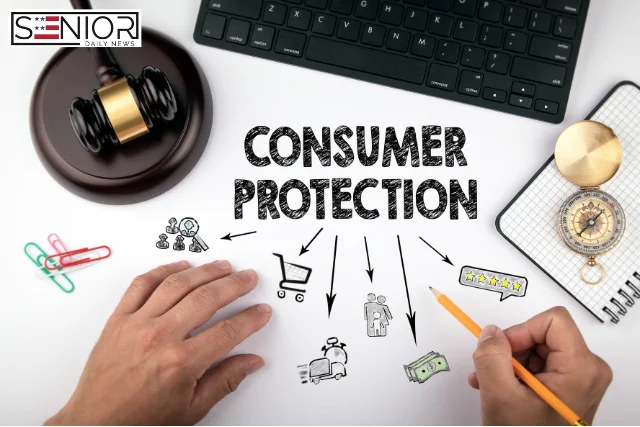The Latest in Consumer Protection Laws for Seniors

In today’s complex and fast-moving marketplace, consumer protection laws play a critical role in safeguarding buyers from fraud, deception, and abuse. For older adults, these protections are especially important. Seniors often face unique challenges: they may be targeted by scams, pressured into unfair contracts, or struggle with complex terms and conditions. Fortunately, recent updates to consumer protection laws are helping to close these loopholes and better defend seniors across the United States.
This article breaks down the latest developments in consumer protection laws aimed at helping seniors make safer, more informed decisions. Whether you’re concerned about phone scams, misleading advertising, deceptive financial products, or fraud in healthcare, knowing your rights can make all the difference.
Why Seniors Need Extra Protection
Age-Related Vulnerabilities
As people age, cognitive decline, memory challenges, and slower reaction times can make it easier for scammers to deceive them. Many seniors also tend to be more trusting and polite — qualities that, sadly, can be exploited.
Financial Security
Seniors often live on fixed incomes and depend on retirement savings, Social Security, or pensions. A single instance of fraud or deceptive marketing can have devastating consequences. That’s why laws are evolving to provide added layers of safety.
Major Areas of Legal Change and Protection
1. Telemarketing and Robocalls: Stronger Crackdowns
Seniors have long been a top target for telemarketing scams. To combat this:
- The Telephone Robocall Abuse Criminal Enforcement and Deterrence (TRACED) Act has given regulators more power to penalize robocallers.
- The Federal Communications Commission (FCC) now requires phone carriers to use STIR/SHAKEN technology, which verifies caller identity and helps block spoofed numbers.
- States like California and New York have introduced additional local protections to restrict robocalls during certain hours or completely ban unsolicited sales calls to numbers on the Do Not Call registry.
2. Elder Financial Exploitation: Tighter Reporting Rules
The Senior Safe Act, passed federally in 2018, continues to see stronger enforcement and educational rollouts. Under this law:
- Banks, credit unions, and financial advisors are encouraged to report suspected financial abuse of seniors without fear of liability.
- Institutions must train employees to recognize red flags of exploitation — such as sudden large withdrawals or a new acquaintance pressuring a senior to access funds.
Several states have expanded these mandates by requiring financial institutions to delay transactions that appear suspicious, buying time to investigate further.
3. Home Improvement and Contractor Scams: New Licensing Laws
Older homeowners are often targets for door-to-door contractor scams — think roofing, plumbing, or pest control.
Recent legal updates in many states include:
- Mandatory licensing for home improvement contractors.
- Cancellation windows extended up to 5–10 days for door-to-door sales contracts, giving seniors time to think or consult family.
- Penalties for misrepresentation have increased, and some states now require contractors to present a “plain language disclosure form” outlining costs, permits, and cancellation rights.
4. Consumer Financial Products: Clearer Terms and Greater Accountability
The Consumer Financial Protection Bureau (CFPB) has issued more guidelines to protect seniors from misleading financial products, including:
- Reverse mortgages
- Annuities and investment products
- Medical credit cards
These rules emphasize simpler disclosures, cooling-off periods, and protection against deceptive marketing tactics. Several insurance commissions now also require agents to act in the best interests of the consumer, especially when dealing with vulnerable adults.
State-Level Innovations Worth Knowing
Florida: “Senior Protection Law” Upgrades
In Florida, new legislation passed in 2024 allows law enforcement and Adult Protective Services to place emergency holds on suspicious transactions if elder fraud is suspected. The state also implemented a public awareness campaign in partnership with AARP.
California: Digital Privacy for Seniors
California’s Consumer Privacy Act (CCPA) was amended to improve digital rights for all residents — including the elderly. Seniors can now more easily:
- Opt-out of data-sharing on retail and healthcare websites
- Access explanations of how their data is used
- File complaints online with streamlined tools
Texas: Retirement Community Oversight
Texas passed new rules to oversee the marketing practices of retirement communities and assisted living facilities. These include:
- Prohibiting the use of misleading “limited time offer” tactics
- Mandating clear contracts with itemized fees
- Ensuring access to independent reviews of facility quality
Technology and Online Scams: What’s Being Done?
Fake Tech Support and Romance Scams
Scams targeting older adults online are on the rise, especially fake tech support calls or emails and online dating frauds. In response:
- The Federal Trade Commission (FTC) has increased collaboration with internet providers to block phishing emails and fraudulent pop-up ads.
- Social media companies now face legal consequences if they fail to remove scam accounts when alerted — especially those targeting older users.
AI-Generated Scams: A New Frontier
With the advent of voice-mimicking artificial intelligence, criminals can now fake a grandchild’s voice in distress calls asking for money.
To address this:
- Lawmakers are debating the NO FAKES Act, which would criminalize AI impersonations used in scams.
- Public campaigns are educating families on the “grandparent scam” and encouraging the use of safe words or code phrases for emergencies.
New Consumer Tools Seniors Should Know
Government Hotlines and Websites
- Eldercare Locator (1-800-677-1116): A federal service connecting seniors to local help.
- ReportFraud.ftc.gov: A simple online portal to report fraud.
- ConsumerFinance.gov: Offers resources on spotting financial abuse and managing money in later life.
Legal Aid and Advocacy
Some states now fund senior legal aid clinics that offer free help with fraud cases or contract reviews.
State attorney general offices often have a division focused on elder rights.
Organizations like the National Center on Law & Elder Rights (NCLER) provide webinars, guides, and referrals.
Protecting Yourself: Smart Steps to Take Today
Sign Up for Fraud Alerts
Most banks and credit card companies offer free fraud alerts via text or email. Set these up to catch unusual activity quickly.
Add a Trusted Contact
Ask your bank or investment advisor to add a “trusted contact person” to your accounts. This gives them someone to call if suspicious behavior is noticed.
Review Contracts Slowly
Don’t feel rushed to sign any contract. Ask for written copies and review them with a trusted friend, family member, or lawyer. Take advantage of cooling-off periods whenever possible.
Use Call Blocking Services
Landline users can request call blocking from their service provider. Smartphones often have apps (many free) that block robocalls and flag potential scams.
Looking Ahead: What’s on the Horizon?
As lawmakers catch up with evolving technology and scam techniques, we can expect:
- Stricter AI regulations targeting voice and image impersonation fraud.
- Expanded digital privacy laws for seniors using healthcare apps and wearable devices.
- National registry for senior-specific scams — helping law enforcement track and predict fraud trends.
Importantly, more laws will focus on empowering seniors, not just protecting them. This means clearer communication, stronger penalties for abusers, and easier access to justice.
Frequently Asked Questions (FAQs)
1. What are the most common scams targeting seniors today?
The most common scams include phone-based fraud (like IRS or Medicare imposters), fake tech support, romance scams, and deceptive home improvement offers. Scammers may also use AI to impersonate loved ones in distress.
2. Can seniors really stop a financial transaction if they suspect fraud?
Yes. Many states now allow financial institutions to delay suspicious transactions and require them to report potential elder abuse. Seniors can also freeze or review accounts with the help of a trusted contact.
3. Are robocalls illegal now?
Unsolicited robocalls, especially those selling products or pretending to be from government agencies, are illegal. Laws like the TRACED Act have given regulators more tools to penalize offenders and block calls.
4. How can seniors protect their online identity?
Use strong passwords, avoid clicking on unknown links, and regularly check credit reports. Seniors in states like California have the added benefit of advanced online privacy rights under laws like the CCPA.
5. What should I do if I suspect a scam?
Report it immediately to the FTC at ReportFraud.ftc.gov. Also inform your bank or utility company, and consider freezing your credit. Sharing your story can also help others avoid similar scams.
Image Designed Using Canva






